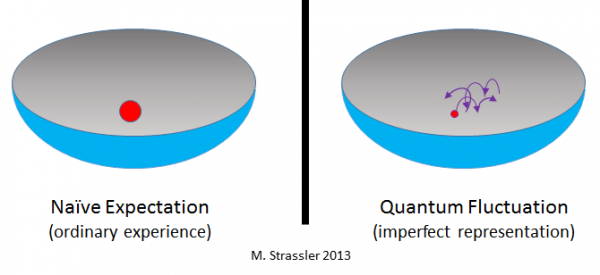“What we observe is not nature itself, but nature exposed to our method of questioning.” -Werner Heisenberg
You might think there are few sacred quantities when it comes to matter: properties that are so fundamentally inherent that even the weirdness of quantum mechanics can't touch them.
 Image credit: Matt Strassler, via http://profmattstrassler.com/articles-and-posts/particle-physics-basics….
Image credit: Matt Strassler, via http://profmattstrassler.com/articles-and-posts/particle-physics-basics….
But the quantum nature of the Universe will have none of our prejudices, and will simply do what it does whether we like it or not. And that means, puzzlingly enough, that it's physically impossible to know, exactly, what the mass of any one particle actually is!
![Image credit: BESIII Collaboration (Ablikim, M. et al.) Phys.Rev. D87 (2013) 11, 112004 arXiv:1303.3108 [hep-ex].](/files/startswithabang/files/2014/07/etime-600x211.png) Image credit: BESIII Collaboration (Ablikim, M. et al.) Phys.Rev. D87 (2013) 11, 112004 arXiv:1303.3108 [hep-ex].
Image credit: BESIII Collaboration (Ablikim, M. et al.) Phys.Rev. D87 (2013) 11, 112004 arXiv:1303.3108 [hep-ex].
How does this work? Go read the whole thing and find out!
- Log in to post comments

What do you think of this article and how it could affect quantum mechanics, especially how it can explaine some of these effects:
http://www.wired.com/2014/06/the-new-quantum-reality/
@Ethan, the stable particles (electrons, protons and photons) don't have a natural width. Their masses are delta functions.
The uncertainty relation you quote (dE dT >= hbar) simplifies the true situation. Unstable particles have a line shape described by the Breit-Wigner distribution (like an asymmetric Gaussian with a high tail on the positive side). The "delta-t" is really the full width at half maximum (FWHM) of the particle's line shape.
Any individual particle has a mass chosen from the BW treated as a probability distribution (technically, a probability density function). In principle, it's possible for "a single" particle to have a mass two, three, even ten times the particle's average value (and of course we see some of these, when we make histograms like your figure), albeit with an exponentially suppressed probability.
Maybe this is a dumb question, but would electrical charge be uncertain for unstable particles as well? An unstable particle brought into proximity to a stable charged particle would acquire some electrical potential energy. Would there not be an uncertainty in this energy? Would that not imply an uncertainty in the charge of the unstable particle, or would positional uncertainty account for the energy uncertainty?
@Sean T #3: Electric charge is directly quantized, and doesn't have an associated conjugate variable, so it is not subject to the same kind of uncertainty relations as [p,x] and [E,t] (the latter, by the way, can be derived almost trivially from the Fourier transform).
Thanks for the explanation! I have wondered how different experiments (CDF, ATLAS etc.) may produce slightly different elementary particle (i.e. Higgs) masses and the physicist don't seem bothered too much. But if different detection signatures favor slightly different energy(=mass) distributions, everything starts to make sense.
@Peter #5: The different experiments, and even different analyses within a single experiment, may produce different "measured" mass distributions. This is simply a consequence of statistical sampling combined experimental resolution and uncertainties. We presume that the "true" mass distribution is the same (as it must be if only a single particle type is involved).
Here's a simple analogy. Supposed you take a pair of properly balanced, unbiased dice, and start rolling them. Make yourself a histogram (frequency distribution) of the numbers that come up, from 2 to 12. If you rolled the dice an infinite number of times, exactly 1/6 of the time you'd get a 7, for example. But in reality, if you roll 60 times, you might get eight 7's, or ten 7's, or even twelve 7's. That variation doesn't mean the dice are intrinsically different, it's just the normal variance from sample to sample.
Michael, not necssarily true, in a sense: eletron charcge may be hidden by the presence of virtual particles prefering to be of the opposite charge around for longer (as a consequence of energy borrowing within uncertainity limits).
At least when I were a lad...